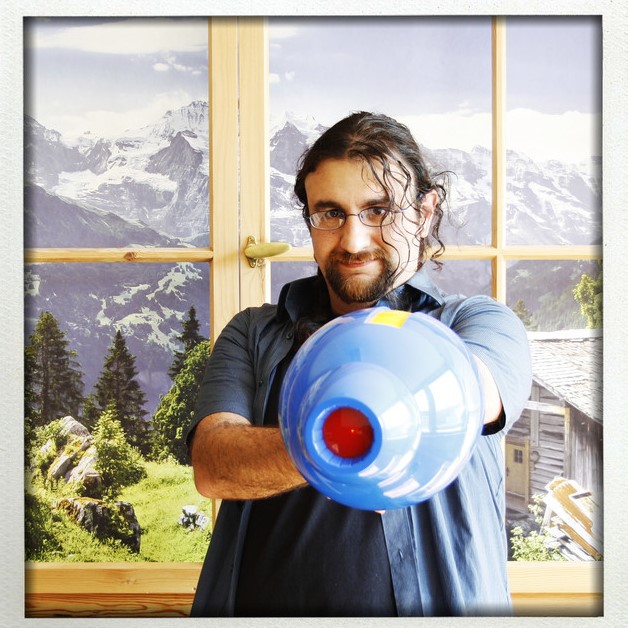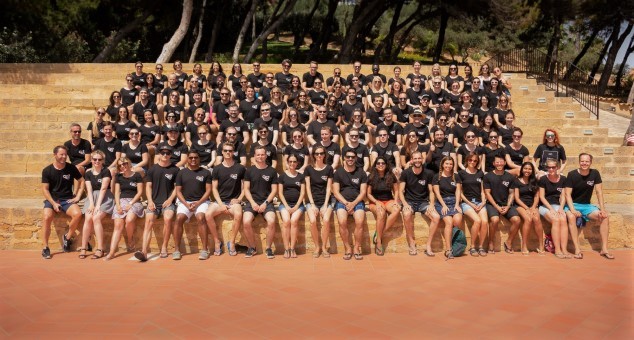In the series “Job Profiles”, we talk to various members of the InterNations team about their position and the work they do.
For this article, we interviewed Ariel, one of the backend developers on our team.

What is your role at InterNations? And how long have you been working here?
I joined InterNations a little more than four years ago, in mid-March 2016. I was hired as a backend engineer. This means I work on the code running on the servers of the InterNations platform, be it the code that supports our website or some of the infrastructure in the background, such as event invitations and other email notifications, all those things. Eventually — circa two years ago, I think — I was promoted to Team Lead Software Engineering for one of our Product Experience Teams, or PXTs for short.
Right now, there are seven other people in my PXT — eight if you count the one who’ll be returning from maternity leave next month — and I’m directly responsible for all five developers in the team, both frontend and backend engineers. As the Team Lead, I still need an in-depth knowledge of all the technical details in order to coordinate their work, to provide support, and to guide the development going forward. Since I’m the people manager for the engineers on the team, I decide which tasks they should take on board next. I also organize their annual performance evaluation, as well as other personal development talks. Together with Dominik, our Product Manager, I figure out the general direction in which to take the PXT.
I’m still wearing my hat as a backend engineer, too, so I take part in the actual coding myself. However, I wouldn’t say I’m a primary contributor when it comes to the sheer volume of code we produce, and the more time-critical tasks are better left to other team members, who can fully focus on them. Still, I spend about half my time writing code, sometimes less, but rarely more.

You just mentioned that you and Dominik, one of our Product Managers, are responsible for the general direction your PXT should take next. How does this work in practice?
The product side is supposed to understand the business requirements and the needs of our users, to determine what the product should evolve into — which new experiments to undertake, which new features we could add, or which old ones we should retire. Conducting user research for this purpose is completely in the hands of the Product Management and UX Design Teams. Basically, it’s their job to understand the “squishy humans”!
On the technical side, we then translate their concepts into code, so we can actually run them on our system; we also need to be aware of which parts these changes might interfere with on our platform, how cost-intensive it will be to implement them, and whether there are any bugs that need fixing. In short, if product management is all about what we are going to do, then engineering is a question of how and how much.
Those general responsibilities are divided between Dominik and me, but our decision-making process is still based on shared communication and a mutual understanding of the respective issues. For example, Dominik is very much involved when we discuss the technical questions among the team, so he can understand where certain complexities and costs come from.
I don’t want to give the impression that the two of us guiding the team together involves Dominik and me sitting in a room, coming up with a solution to our latest problem, and announcing it to the rest of the PXT, just handing it down like the prophet from the mountain. We both want to make sure that our decision-making process is open and transparent, that we collect input from everybody else, and that we get their buy-in. People need to understand where we’re coming from and why we’re going in a specific direction. We probably wouldn’t get very far if we tried to do otherwise.

Which features does your Product Experience Team usually work on?
When this PXT was established, our main responsibility was the “offline” part of the product — everything directly or indirectly related to our official events and activities, for example, the InterNations Groups, photos and media, the mailer and messaging infrastructures, and so on. Eventually, we also inherited the Guest List Manager app used by our event hosts from the Apps Team.
After a while, however, the idea was put forward to make the PXTs more dynamic and allow them to take over initiatives that aren’t necessarily part of their domain. During that time, one of our major tasks was the SEO landing pages project, which I think Felix has already discussed in his recent interview. We moved all the external subpages — that help users find us through their Google search results and entice them to join InterNations — to a separate content management system. Before that they were hardcoded and thus part of our main platform, but they are now hosted on WordPress and can be updated much faster. There are still some minor complications to iron out, but the project is mostly over and done with.
It was also a precedent of what would become our general strategy for the various PXTs in 2020: defining the core parts that contribute directly to our business and focusing on building and maintaining those; what’s not a core part of InterNations, we can try to outsource to third-party providers to save our developers quite a bit of work. This wasn’t our explicit goal when we started the SEO initiative, but in retrospect, it fits this new line of thought very well.

And what are you working on right now? If your PXT still owns the whole “Events” topic, has your road map changed because of the COVID-19 crisis?
Going into 2020, our PXT had been resuming work on the “offline” product. And, yes, most of the initiatives originally outlined in our 2020 strategy have been put on the backburner due to the COVID-19 crisis. Our PXT is currently doing whatever needs to be done to support the new kinds of online events and virtual activities that InterNations started offering in response to the crisis.
We’ve had to make a lot of changes on the spot and put some stopgap measures in place, such as hitting the brakes and suspending all event notifications when the outbreak turned into a pandemic, adding some smaller tweaks to the newly introduced online events, for example, enabling event hosts to add a link to their online meeting and making sure that only people who’ve signed up to attend can actually see this link. Moreover, the Community Engagement Team only had the ability to cross-promote official events in other InterNations Communities, but not the smaller, more spontaneous activities. Obviously, this doesn’t make sense if people can’t travel and all events are virtual ones anyway, so we’ve added this cross-promotion feature to activities to give them a wider reach as well.
Doing this has forced us, for example, to postpone a long-standing project that was already part of the strategy for 2020: addressing the artificial division between official events and activities. This distinction applies to both the product logic and the code; in the codebase, they are two completely separate universes. Our members, however, hardly ever see the difference between the two formats and think they are more or less the same.
So, we’d been talking for a long time about merging official events and activities into a single category — one codebase to rule them all, and one interface for both users and admins. This will also lay the groundwork for future innovations. But this is big and massive and definitely not a project where you can just snap your fingers and do it in one go. It’s something we’ll have to sort out step by step, but for obvious reasons, it’ll have to wait a bit right now.

Where did you work before joining the InterNations Team? Was this job the reason you moved to Munich?
I grew up in Chile and moved to Israel at the age of 18. All in all, I would stay there for 13 years. When I enrolled in my computer science course at the Technion in 2002, my younger and more naïve self was planning ultimately to settle in Japan and develop video games. What I actually did was to get a student job at the IBM research lab in Haifa, which turned into my first full-time job.
I stayed at IBM for a total of seven years, working in their Verification Tools Department, where it was our job to develop the technologies other people in the company could use to detect bugs in the chips produced by IBM. I was also involved with another hardware research project; somewhere out there, in some very very expensive mainframe, there’s a piece of silicone we wrote. But I literally cannot tell you what it actually does; it was the kind of work I had to sign a non-disclosure agreement for.
Then I started to get restless and wanted to do something different. A friend of mine was working at Limelight Networks at the time. They provide content-delivery networks, a geographically distributed network of proxy servers and their data centers that make internet traffic faster and relieve bottlenecks in the infrastructure. Our team was working on acceleration technologies to make websites load and run faster on the client machines.
After two years at their office in Ramat Gan, I seized the chance to transfer to their branch in Munich. Unfortunately, I’d been there for just about a year when my employer had to shut down my entire team as part of some massive downsizing measures. That’s why I started looking for another IT job in Munich, found InterNations, and the rest, as they say, is history.
So, what do you enjoy most about working at InterNations?
Why do you even still ask this question? In 99 out of 100 cases, the answer will always be the same — the people here are awesome.

I was just going to say that you aren’t allowed to answer, “the people”. Everyone I speak to seems to love the team, but I’d like you to think outside the box . . .
Fair enough, but I’m going to cheat a little bit. What I am going to say then is still something that very much depends on the people I work with. It’s the open-communication culture we have, the way we can simply put things out into the open and have constructive disagreements. In our team, you can talk openly about how you see an issue and have a discussion based on that. Once all the arguments have been put forward and a decision has been made, everyone falls in line again and we go ahead with whatever has been decided. I think this is a very healthy culture of dissent.
Moreover, there’s another great thing about the people you’re working with at InterNations. Day in and day out, we have so many opportunities to learn from each other. We are aware that everyone has something to bring to the table and that we can all benefit from this. I think this is quite engrained in our team. For example, we actively encourage our developers to pair up and work on a topic together. They will literally be sitting in front of the computer and coding in pairs. Generally speaking, it’s no shame to ask for help if you’re stuck, quite the opposite. We want people to ask someone else from their PXT, or from another team, to get the expertise they need to succeed.
In addition to our regular team retrospectives, we also have exchange sessions for the engineers from all PXTs every couple of weeks, to share our knowledge and discuss tech topics that aren’t directly related to our work. For example, Chris, one of our Frontend Engineers, recently hosted a workshop on how to build an Alexa feature. Such occasions make it possible for us to poke at and play with different technology for a bit. But, a lot of the time, learning from each other just happens informally and organically.

You mentioned before that you originally moved to Munich because your previous employer offered to transfer you to their local branch office. Did I get that right?
No, actually, I decided to move to Munich first and then talked to my boss about giving notice. She then offered to have the company rehire me at their Munich branch. After more than a dozen years in Israel, I was ready to explore expat life in a different place. I’d done some research into potential destinations and liked what I found out about Munich: really good quality of life, really nice weather —
Sorry for interrupting you, but the weather? I think you’re the first team member to tell me he moved to Munich for the nice weather . . .
Seriously, I really like the local weather, though I’m a bit disappointed we don’t seem to get proper winters anymore. The first time I visited Munich I came here during Christmastime: snow, Christmas markets, cold temperatures — it was perfect! And then I discovered Doppelbock beer and fell in love.
Has Munich lived up to your expectations then? What’s your view of local life now?
It’s a much more relaxed way of life here. The one downside everyone will probably agree on is how hard it is to find a place to live. It’s hard for everyone, but especially if you don’t speak German. Some landlords may not even speak Hochdeutsch (standard German, as opposed to a dialect). But all in all, I’m happy here and I think Munich is pretty cool. It’s not a massively large city, but there’s enough going on so that life never gets boring.

And what do you do around here when you’re not busy coding?
As a big fan of board games, I really recommend going to Spielwiesn, the local three-day trade fair and interactive event for all kinds of board and party games. I’ve also been dreaming of going to Essen in order to attend Spiel, the biggest board-game trade fair worldwide, but I haven’t made it there yet. I was planning to purchase a ticket for 2020, but, well, things happened. With the whole coronavirus crisis, it might not even take place this year.
Apart from board games, my favorite hobby is karaoke. Munich has a pretty large and lively karaoke scene. Theoretically, you could go to a different karaoke night every single day of the week, for example, at Kennedy’s near Sendlinger Tor, just a stone’s throw away from the InterNations office, or at The Cave in Schwabing, which is owned by friends of mine.
Do you have a favorite song to perform?
My current favorite tends to vary because I try to pick up new things and expand my musical repertoire a bit. But what you could probably call my biggest hit is “Gangnam Style”. I also performed it at last year’s InterNations Christmas party.
Image credit: InterNations / iStockphoto
[…] engineering that allows our users to view and interact with the graphical interface. I’m part of Ariel’s PXT (Product Experience Team). We are responsible for everything directly or indirectly related to the InterNations Official […]